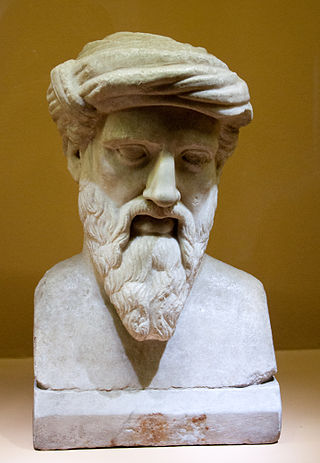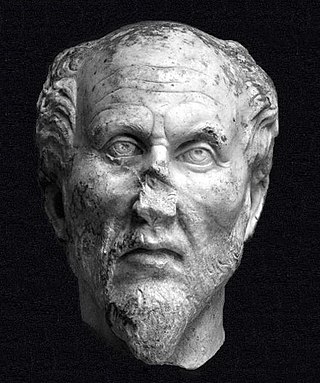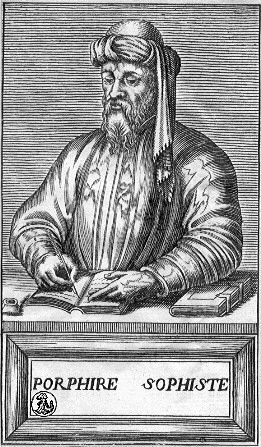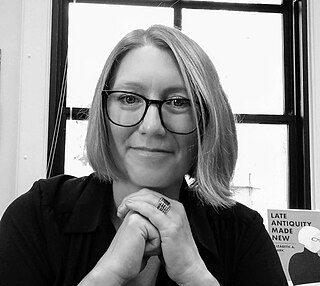Related Research Articles
Ammonius Saccas was a Hellenistic Platonist self-taught philosopher from Alexandria, generally regarded as the precursor of Neoplatonism and/or one of its founders. He is mainly known as the teacher of Plotinus, whom he taught from 232 to 243. He was undoubtedly the most significant influence on Plotinus in his development of Neoplatonism, although little is known about his own philosophical views. Later Christian writers stated that Ammonius was a Christian, but it is now generally assumed that there was a different Ammonius of Alexandria who wrote biblical texts.
In the Platonic, Neopythagorean, Middle Platonic, and Neoplatonic schools of philosophy, the demiurge is an artisan-like figure responsible for fashioning and maintaining the physical universe. The Gnostics adopted the term demiurge. Although a fashioner, the demiurge is not necessarily the same as the creator figure in the monotheistic sense, because the demiurge itself and the material from which the demiurge fashions the universe are both considered consequences of something else. Depending on the system, they may be considered either uncreated and eternal or the product of some other entity.

Pythagoras of Samos was an ancient Ionian Greek philosopher, polymath and the eponymous founder of Pythagoreanism. His political and religious teachings were well known in Magna Graecia and influenced the philosophies of Plato, Aristotle, and, through them, the West in general. Knowledge of his life is clouded by legend; modern scholars disagree regarding Pythagoras's education and influences, but they do agree that, around 530 BC, he travelled to Croton in southern Italy, where he founded a school in which initiates were sworn to secrecy and lived a communal, ascetic lifestyle. This lifestyle entailed a number of dietary prohibitions, traditionally said to have included aspects of vegetarianism.

Plotinus was a Greek Platonist philosopher, born and raised in Roman Egypt. Plotinus is regarded by modern scholarship as the founder of Neoplatonism. His teacher was the self-taught philosopher Ammonius Saccas, who belonged to the Platonic tradition. Historians of the 19th century invented the term "neoplatonism" and applied it to refer to Plotinus and his philosophy, which was vastly influential during late antiquity, the Middle Ages, and the Renaissance. Much of the biographical information about Plotinus comes from Porphyry's preface to his edition of Plotinus' most notable literary work, The Enneads. In his metaphysical writings, Plotinus described three fundamental principles: the One, the Intellect, and the Soul. His works have inspired centuries of pagan, Jewish, Christian, Gnostic, and early Islamic metaphysicians and mystics, including developing precepts that influence mainstream theological concepts within religions, such as his work on duality of the One in two metaphysical states.
Theurgy, also known as divine magic, is one of two major branches of the magical arts, the other being practical magic or thaumaturgy. Theurgy describes the ritual practices associated with the invocation or evocation of the presence of one or more deities, especially with the goal of achieving henosis and perfecting oneself.
Christian philosophy includes all philosophy carried out by Christians, or in relation to the religion of Christianity. Christian philosophy emerged with the aim of reconciling science and faith, starting from natural rational explanations with the help of Christian revelation. Several thinkers such as Origen of Alexandria and Augustine believed that there was a harmonious relationship between science and faith, others such as Tertullian claimed that there was contradiction and others tried to differentiate them.

Porphyry of Tyre was a Neoplatonic philosopher born in Tyre, Roman Phoenicia during Roman rule. He edited and published The Enneads, the only collection of the work of Plotinus, his teacher.

Thomas Taylor was an English translator and Neoplatonist, the first to translate into English the complete works of Aristotle and of Plato, as well as the Orphic fragments.

Platonism is the philosophy of Plato and philosophical systems closely derived from it, though contemporary Platonists do not necessarily accept all doctrines of Plato. Platonism has had a profound effect on Western thought. At the most fundamental level, Platonism affirms the existence of abstract objects, which are asserted to exist in a third realm distinct from both the sensible external world and from the internal world of consciousness, and is the opposite of nominalism. This can apply to properties, types, propositions, meanings, numbers, sets, truth values, and so on. Philosophers who affirm the existence of abstract objects are sometimes called Platonists; those who deny their existence are sometimes called nominalists. The terms "Platonism" and "nominalism" also have established senses in the history of philosophy. They denote positions that have little to do with the modern notion of an abstract object.
John Myles Dillon is an Irish classicist and philosopher who was Regius Professor of Greek in Trinity College, Dublin between 1980 and 2006. Prior to that he taught at the University of California, Berkeley. He was elected a corresponding member of the Academy of Athens on 15 June 2010. Dillon's area of research lies in the history of Platonism from the Old Academy to the Renaissance, and also Early Christianity.
Neoplatonism was a major influence on Christian theology throughout Late Antiquity and the Middle Ages in the East, and sometimes in the West as well. In the East, major Greek Fathers like Basil, Gregory of Nyssa and Gregory of Nazianzus were influenced by Platonism and Neoplatonism, but also Stoicism often leading towards asceticism and harsh treatment of the body, for example stylite asceticism. In the West, St. Augustine of Hippo was influenced by the early Neoplatonists Plotinus and Porphyry. Later on, in the East, the works of the Christian writer Pseudo-Dionysius the Areopagite, who was influenced by later Neoplatonists such as Proclus and Damascius, became a critical work on which Greek church fathers based their theology, like Maximus believing it was an original work of Dionysius the Areopagite.
Origen the Pagan was a Platonist philosopher who lived in Alexandria. He was a student of Ammonius Saccas and a contemporary of Plotinus in Ammonius's philosophy school in Alexandria. Some researchers posit that this Origen is the very same famous Christian philosopher and theologian Origen of Alexandria, who was educated by Ammonius Saccas. The pagan philosopher is sometimes referred to as Origenes to distinguish him more easily from the Christian Origen.
Sosipatra was a Greek Neoplatonist philosopher and mystic who lived in Ephesus and Pergamon in the first half of the 4th century CE. The story of her life is told in Eunapius' Lives of the Sophists.
Neoplatonism is a version of Platonic philosophy that emerged in the 3rd century AD against the background of Hellenistic philosophy and religion. The term does not encapsulate a set of ideas as much as a series of thinkers. Among the common ideas it maintains is monism, the doctrine that all of reality can be derived from a single principle, "the One".
The True Word is a lost treatise in which the ancient Greek philosopher Celsus addressed many principal points of early Christianity and refuted or argued against their validity. In The True Word, Celsus attacked Christianity in three ways: by refuting its philosophical claims, by marking it as a phenomenon associated with the uneducated and lower class, and by cautioning his audience that it was a danger to the Roman Empire. Information concerning the work exists only in the extensive quotations from it in the Contra Celsum, written some seventy years later by the Christian Origen. These are believed to be accurate as far as they go, but may not give a fully comprehensive picture of the original work.

Since the arrival of Christian missionaries in India in the 1st century, followed by the arrival of Buddhism in Western Europe in the 4th and 5th centuries, similarities have been perceived between the practices of Buddhism and Christianity. During the 20th century, the differences between these two belief systems were also highlighted.

Many interpreters of Plato held that his writings contain passages with double meanings, called allegories, symbols, or myths, that give the dialogues layers of figurative meaning in addition to their usual literal meaning. These allegorical interpretations of Plato were dominant for more than fifteen hundred years, from about the 1st century CE through the Renaissance and into the 18th century, and were advocated by major Platonist philosophers such as Plotinus, Porphyry, Syrianus, Proclus, and Marsilio Ficino. Beginning with Philo of Alexandria, these views influenced the Jewish, Christian, and Islamic interpretation of these religions' respective sacred scriptures. They spread widely during the Renaissance and contributed to the fashion for allegory among poets such as Dante Alighieri, Edmund Spenser, and William Shakespeare.

Meredith J. C. Warren is a Senior Lecturer in Biblical and Religious Studies at the University of Sheffield. She is known for her views on the New Testament and early Judaism as well as for her media appearances for such outlets as The Washington Post, and BBC radio. She is a Metis citizen of the Manitoba Metis Federation.

Ilaria L. E. Ramelli is an Italian-born historian, academic author, and university professor who specializes in ancient, late antique, and early mediaeval philosophy and theology.

Kristi Upson-Saia is a Historian of Late Antiquity. She holds the David B. and Mary H. Gamble Professorship in Religion at Occidental College, Los Angeles, California. She specialises in the history of medicine, health and healing, and religions in the late ancient Mediterranean.
References
- ↑ "University of Manitoba – Faculty of Arts – Religion – Heidi Marx". umanitoba.ca. Retrieved 2018-12-09.
- 1 2 3 4 5 6 7 8 9 10 11 12 "Heidi Marx". Heidi Marx. Retrieved 2018-12-09.
- 1 2 3 "Heidi Marx (formerly Marx-Wolf) | University of Manitoba - Academia.edu". umanitoba.academia.edu. Retrieved 2018-12-09.
- ↑ "ReMeDHe". ReMeDHe.